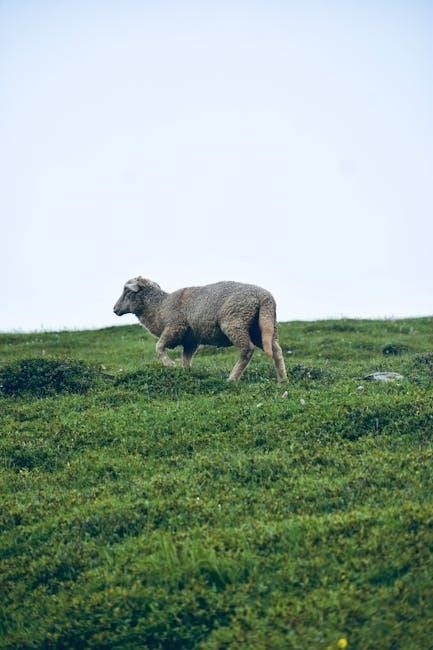This comprehensive PDF study guide provides in-depth questions and answers to enhance understanding of George Orwell’s Animal Farm. It provokes critical thinking and analysis, covering key themes, characters, and historical context, while preparing students for exams and discussions. Download the PDF for a detailed exploration of the novella.
Overview of the Study Guide
This comprehensive Animal Farm Study Guide covers all chapters of George Orwell’s novella, providing detailed questions and answers to enhance understanding. It includes chapter summaries, character analyses, and thematic explorations, along with historical context and literary devices. The guide is structured to help students analyze the allegory, track character development, and grasp the novel’s political satire. Designed for both individual and group study, it offers comprehension questions, critical thinking prompts, and essay topics. The PDF format ensures easy access, making it a valuable resource for exams, discussions, and deeper engagement with Orwell’s timeless masterpiece.
Importance of Study Guides for Understanding Animal Farm
Study guides are essential for unraveling the complexities of Animal Farm, offering structured insights into its themes, characters, and historical context. They provide a roadmap for analyzing Orwell’s allegory, helping students grasp the novel’s deeper meanings. By breaking down chapters and key events, these guides enable a thorough understanding of the story’s political satire and moral lessons. They also foster critical thinking through targeted questions, encouraging readers to reflect on power dynamics, betrayal, and the erosion of ideals. A well-organized study guide is invaluable for exams, discussions, and fostering a deeper appreciation of Orwell’s timeless commentary on human nature and society.
Structure of the PDF Guide
The PDF guide is meticulously organized to facilitate easy navigation and comprehensive learning. It begins with an overview of the study guide, followed by detailed chapters summarizing key events and analyzing major themes. Each chapter is accompanied by comprehension questions and critical thinking exercises, designed to reinforce understanding and encourage deeper analysis. The guide also includes sections dedicated to character analysis, symbolism, and historical context, ensuring a holistic exploration of Animal Farm. Additional resources and essay topics are provided to support further study and academic preparation.
Plot Summary and Key Events
Old Major’s speech sparks rebellion, leading the animals to overthrow Mr. Jones. The pigs assume leadership, with Napoleon and Snowball conflicting over power. Key events include the Battle of the Windmill and Napoleon’s corrupt transformation, ultimately betraying the revolution’s ideals.
In Chapter 1, Old Major, a wise boar, calls a meeting to share his vision of a rebellion against Mr. Jones, the oppressive farmer. He inspires the animals with his speech about equality and freedom, planting the seeds of revolution. The animals, united by this vision, overthrow Mr. Jones in Chapter 2, renaming the farm “Animal Farm.” The pigs, led by Napoleon and Snowball, take charge, establishing the Seven Commandments of Animalism. This marks the beginning of a new era, filled with hope and idealism, but also hinting at future conflicts.
Study questions for these chapters focus on themes like rebellion, leadership, and the origins of Animalism. For example, “What inspired the animals to rebel?” or “What role did Old Major play in shaping the rebellion?” These questions help students analyze the motivations and actions of key characters, setting the stage for understanding the novella’s deeper themes.
Chapter 3-4: The Rise of Leadership and Conflict
In Chapter 3, the pigs, led by Napoleon and Snowball, begin organizing the farm, with Napoleon focusing on educating the young and Snowball advocating for the construction of a windmill. Their differing ideologies create subtle tensions. Chapter 4 intensifies the rivalry as Napoleon expels Snowball, marking the start of his authoritarian rule. The pigs justify their actions through propaganda, altering the Seven Commandments to suit their interests. Study questions explore the rise of leadership, the clash between Napoleon and Snowball, and the early signs of corruption among the pigs. These chapters highlight themes of power and manipulation.
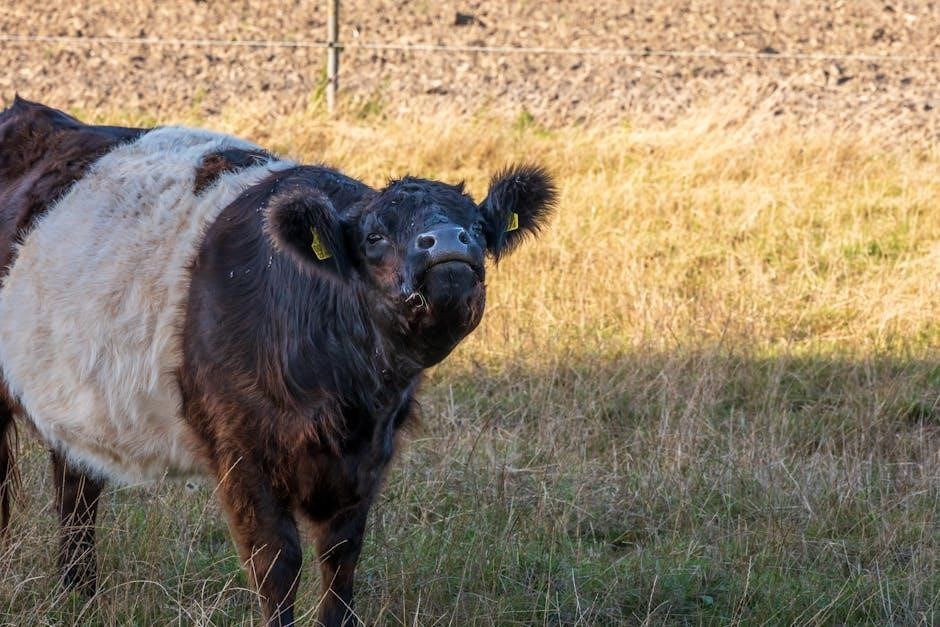
Chapter 5-6: Power Struggles and the Seven Commandments
Chapters 5 and 6 delve into the escalating power struggles and the manipulation of the Seven Commandments. Napoleon consolidates control, using propaganda and fear to justify his decisions, such as altering the commandments to permit the pigs’ consumption of alcohol. The animals, like Boxer, remain loyal despite growing unease. These chapters explore themes of corruption, manipulation, and the erosion of ideals. Study questions focus on Napoleon’s tactics, the impact of the commandments’ alteration, and the animals’ reactions to the pigs’ actions, highlighting the subtle yet significant shift in power dynamics on the farm.
Chapter 7-8: The Battle of the Windmill and Its Aftermath
Chapters 7 and 8 focus on the Battle of the Windmill, a pivotal event where the animals defend their farm against a human attack. The battle showcases unity and sacrifice, particularly through Boxer’s heroism. However, the aftermath reveals manipulation as Napoleon blames Snowball for the windmill’s destruction. The pigs alter the truth, and Boxer’s loyalty is tested when he is injured. These chapters highlight themes of betrayal, propaganda, and the exploitation of power. Study questions explore the battle’s significance, Napoleon’s tactics, and Boxer’s unwavering dedication, illustrating the farm’s downward spiral into corruption and control.
Chapter 9-10: The Final Transformation and Legacy
In the final chapters, the pigs complete their transformation into indistinguishable beings from the humans they initially rebelled against. Napoleon’s rule becomes increasingly tyrannical, and the Seven Commandments are reduced to a single phrase: “All Animals Are Equal / But Some Animals Are More Equal Than Others.” The novel concludes with the pigs embracing human behaviors, such as walking on two legs and carrying whips, symbolizing their complete betrayal of the rebellion’s ideals; The legacy of Animal Farm reflects the corruption of power and the erosion of equality, leaving the animals in a state of despair and subjugation.
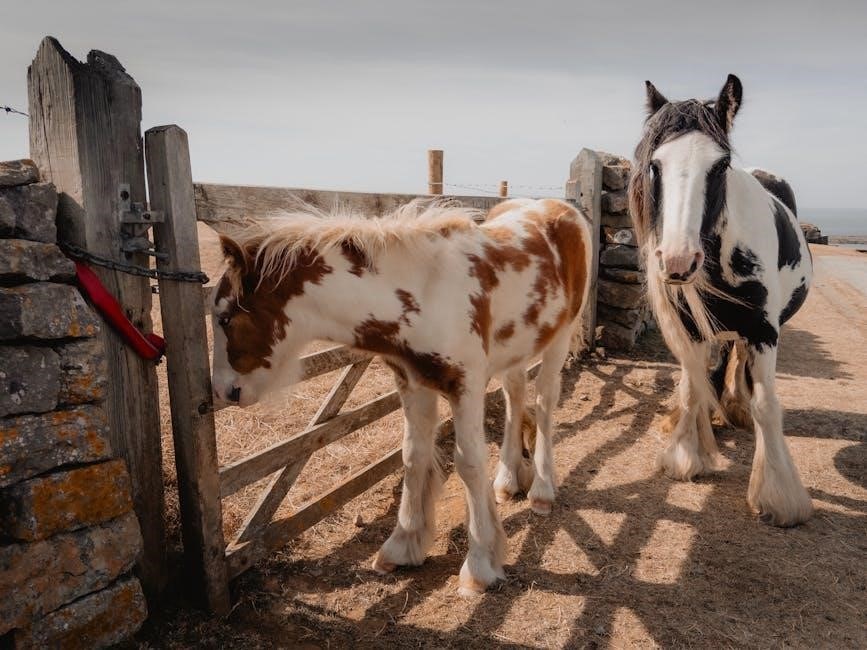
Character Analysis
This section explores the complexities of Napoleon, Snowball, and Boxer, analyzing their motivations and development. It also examines minor characters like Mollie, Benjamin, and Squealer, highlighting their roles in the narrative.
Major Characters: Napoleon, Snowball, and Boxer
Napoleon, Snowball, and Boxer are central figures in Animal Farm, each representing distinct aspects of human nature and historical figures. Napoleon, the cunning and power-hungry leader, embodies totalitarianism, manipulating others to maintain control. Snowball, the idealistic visionary, symbolizes lost hope and betrayal, as his rivalry with Napoleon leads to exile. Boxer, the hardworking and loyal horse, represents the exploited working class, whose dedication is tragically exploited. Their interactions and conflicts drive the plot, reflecting themes of power, corruption, and betrayal. Each character’s journey highlights Orwell’s critique of political systems and human frailty.
Minor Characters: Mollie, Benjamin, and Squealer
Mollie, Benjamin, and Squealer are pivotal minor characters in Animal Farm, each contributing uniquely to the narrative. Mollie, the self-indulgent horse, represents disloyalty and the lure of comfort over revolutionary ideals. Benjamin, the wise and skeptical donkey, embodies intellectual honesty, remaining detached yet loyal to Boxer. Squealer, the manipulative pig, serves as Napoleon’s propagandist, distorting truth to justify tyranny. Together, they illustrate the corruption of power, the loss of idealism, and the exploitation of naive loyalty, enriching Orwell’s allegory of totalitarianism and human nature’s complexities.
Character Motivations and Development
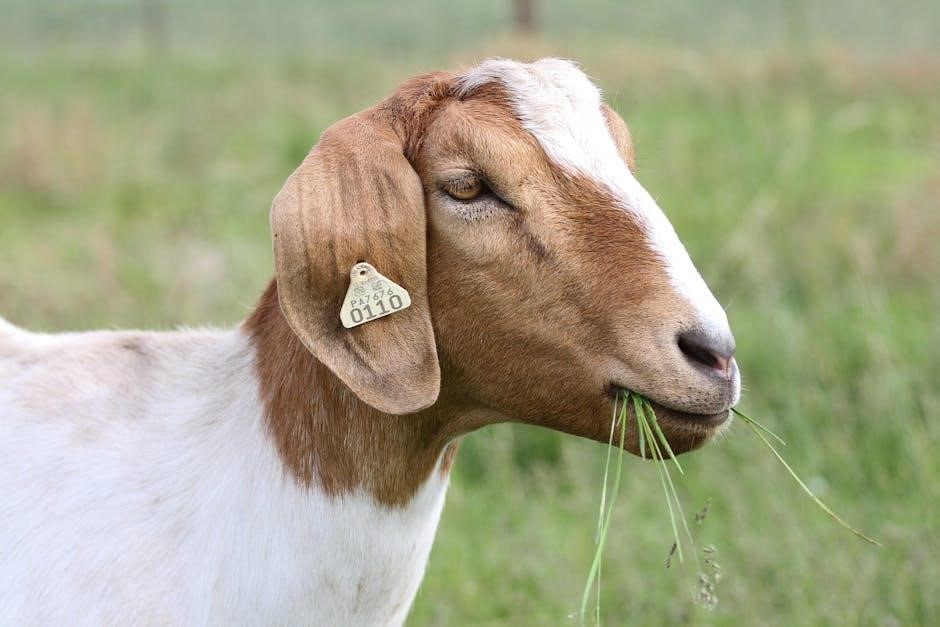
The characters in Animal Farm are driven by distinct motivations that shape their actions and development. Napoleon’s desire for power and control leads him to manipulate and dominate, while Snowball’s idealism fuels his vision of a utopian society. Boxer’s unwavering loyalty and work ethic highlight his dedication to the farm’s success, despite his eventual betrayal. These motivations reflect broader themes of ambition, corruption, and the exploitation of power. Through their development, Orwell critiques totalitarianism, illustrating how even noble intentions can be distorted by greed and manipulation, ultimately undermining the revolution’s original ideals.

Themes in Animal Farm
Animal Farm explores themes of power corruption, totalitarianism, and the erosion of equality and freedom. Orwell critiques how power dynamics lead to manipulation and societal decay, warning against authoritarianism and the loss of individual rights.
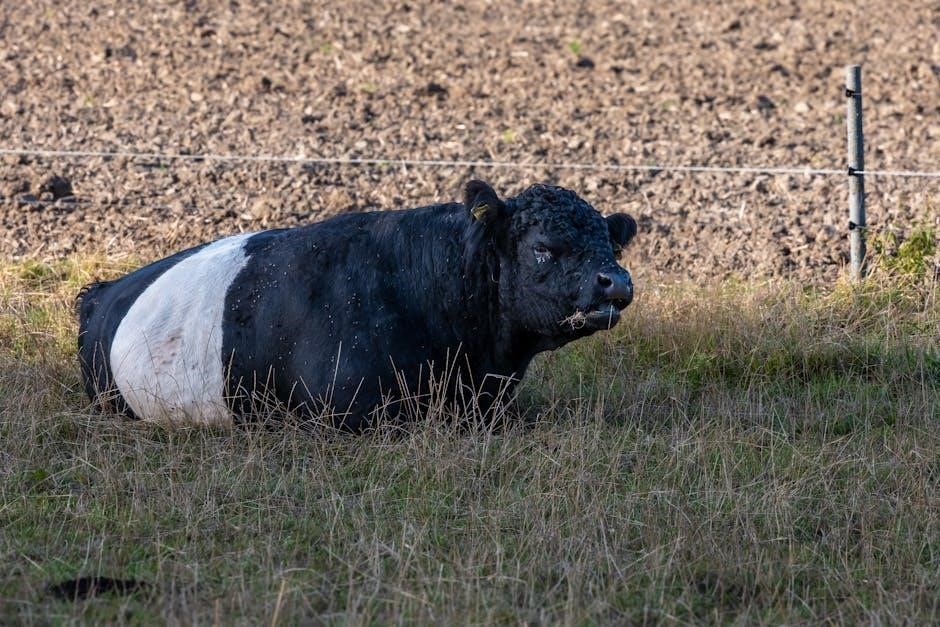
Allegory and Political Satire
Animal Farm is a masterful blend of allegory and political satire, reflecting the Russian Revolution and its aftermath. Orwell uses the farm as a microcosm of society, with animals representing historical figures like Stalin (Napoleon) and Trotsky (Snowball). The novella critiques totalitarianism, illustrating how power corrupts and ideologies are manipulated. Through satire, Orwell exposes the dangers of authoritarianism and the erosion of equality. The study guide questions delve into these themes, prompting readers to analyze how the story mirrors real-world events and the timeless relevance of its warnings against oppressive regimes. This dual-layered narrative makes Animal Farm a profound commentary on human nature and politics.
Power Corruption and Totalitarianism
Animal Farm explores how power corrupts even those with noble intentions, as seen in Napoleon’s rise to dictatorship. The pigs, initially united for equality, gradually abuse their authority, manipulating the Seven Commandments to justify their dominance. This mirrors the dangers of totalitarianism, where leadership becomes oppressive and truth is distorted. The novella highlights how fear and propaganda sustain power, as Napoleon uses Squealer to manipulate public perception. The study guide questions examine how Orwell critiques authoritarian regimes, drawing parallels to historical events like Stalin’s rule. This theme serves as a warning against unchecked power and its corrupting influence on individuals and systems.
Equality, Freedom, and Betrayal
Animal Farm delves into the themes of equality, freedom, and betrayal, as the animals’ rebellion against Mr. Jones initially promises a fair society. However, the pigs’ gradual seizure of power erodes these ideals. The Seven Commandments, meant to ensure equality, are altered to justify the pigs’ dominance, betraying the original vision. Freedom diminishes as dissent is suppressed, and loyalty is exploited, as seen in Boxer’s tragic fate. The study guide questions explore how Orwell critiques the failure of revolutionary ideals and the betrayal of trust, highlighting the tension between aspirations of equality and the realities of power dynamics.
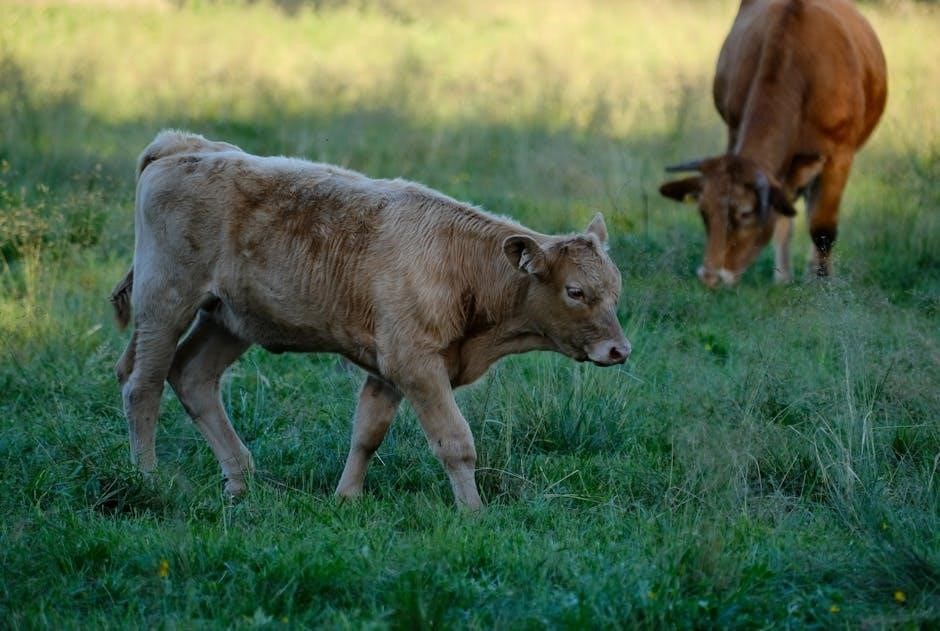
Symbolism and Representation

Animal Farm is rich in symbolism, with the farm representing society and its animals embodying historical figures. The Seven Commandments symbolize revolutionary ideals, while their alteration reflects corruption and power manipulation. Learn more.
The Farm as a Symbol of Society
The farm in Animal Farm symbolizes human society, reflecting its structure and conflicts. The animals represent different social classes and groups, with their struggles mirroring real-world political and economic systems. The pigs symbolize the ruling class, while lower animals reflect the working class. The farm’s transformation illustrates how power dynamics and corruption can erode societal ideals. This allegory allows readers to critique human governance and societal hierarchies through the lens of a fictional agricultural setting. Explore further to understand the depth of this symbolism.
The Animals as Representatives of Historical Figures
In Animal Farm, the animals symbolize key figures from the Russian Revolution. Napoleon represents Joseph Stalin, Snowball embodies Leon Trotsky, and the pigs reflect the Communist Party elite. Boxer symbolizes the working class, while Squealer mirrors propagandists who manipulate public opinion. These characters’ actions and struggles mirror historical events, such as the power struggle between Stalin and Trotsky and the corruption of revolutionary ideals. Orwell uses these representations to critique totalitarianism and the betrayal of socialist principles. Learn more about the historical parallels in the novella.
The Seven Commandments and Their Significance
The Seven Commandments, painted on the barn wall, represent the core principles of Animalism, the ideology driving the rebellion. Initially, they embody equality, unity, and freedom from human oppression. However, as the pigs consolidate power, the commandments are altered, reflecting the corruption of the revolution. Their gradual distortion symbolizes how totalitarian regimes manipulate ideals to justify oppression. The final commandment, “All Animals Are Equal / But Some Animals Are More Equal Than Others,” underscores the novella’s critique of power and hypocrisy. Explore how these commandments evolve and their symbolic significance.
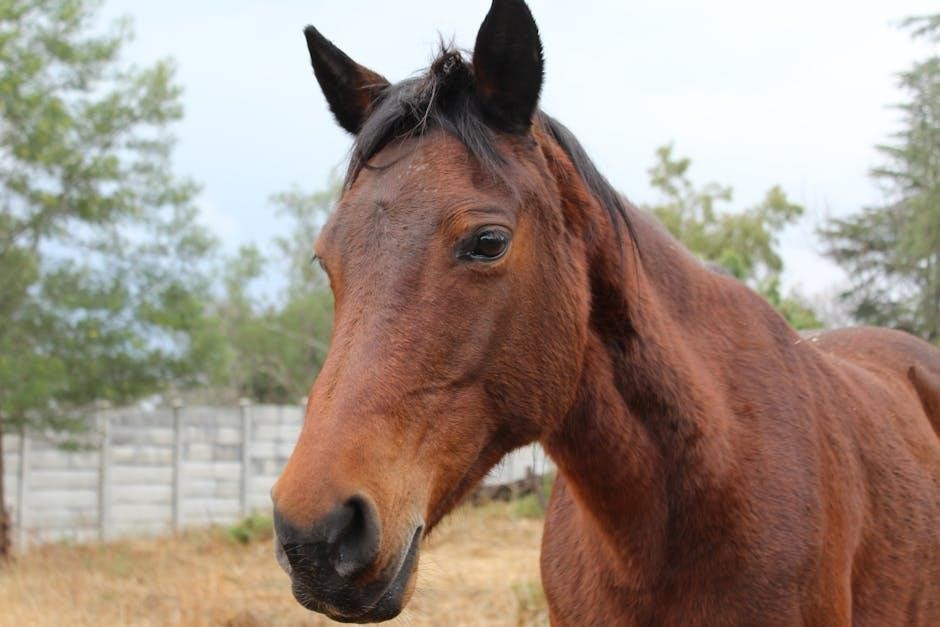
Historical Context
Animal Farm mirrors the Russian Revolution, with characters representing figures like Stalin and Trotsky. Orwell critiques totalitarianism, illustrating its dangers through the corruption of revolutionary ideals.
The Russian Revolution and Its Connection to Animal Farm
Animal Farm serves as an allegory for the Russian Revolution, with characters and events mirroring historical figures and occurrences. Napoleon represents Joseph Stalin, while Snowball embodies Leon Trotsky, highlighting the power struggle and ideological conflicts that arose after Vladimir Lenin’s death. The pigs’ gradual corruption and consolidation of power reflect the failures of the Russian Revolution, as the ideals of equality and freedom were distorted by totalitarianism. Orwell critiques the rise of communism and its betrayal, drawing parallels between the animals’ experiences and the real-life events of the early Soviet Union.
Stalin, Trotsky, and the Rise of Communism
Napoleon and Snowball in Animal Farm symbolize Stalin and Trotsky, respectively. Their rivalry mirrors the political struggle following Lenin’s death, with Napoleon’s rise to power reflecting Stalin’s consolidation of control. Trotsky, like Snowball, was expelled and slandered, while Stalin manipulated ideology to justify authoritarianism. The pigs’ corruption and abuse of power parallel the Soviet regime’s deviation from communist ideals, illustrating Orwell’s critique of totalitarianism and the dangers of unchecked power. This allegorical representation underscores the novel’s warning against the betrayal of revolutionary principles.
Orwell’s Perspective on Totalitarianism
George Orwell’s Animal Farm critiques totalitarianism through its portrayal of Napoleon’s rise to power. Orwell depicts how totalitarian regimes manipulate truth, suppress dissent, and exploit power for control. The pigs’ gradual corruption mirrors the Soviet Union’s deviation from revolutionary ideals, highlighting Orwell’s disdain for authoritarianism. His work serves as a warning against the erosion of freedom and the dangers of unchecked power, reflecting his deep concern over the rise of totalitarian regimes in the 20th century. Orwell’s perspective emphasizes the importance of vigilance against oppression and the preservation of individual freedom.
Literary Devices and Style
Orwell employs allegory, satire, and irony to critique societal issues. His straightforward language and fable-like narrative make complex political themes accessible, enhancing the novella’s timeless relevance and impact.
Allegory and Fable
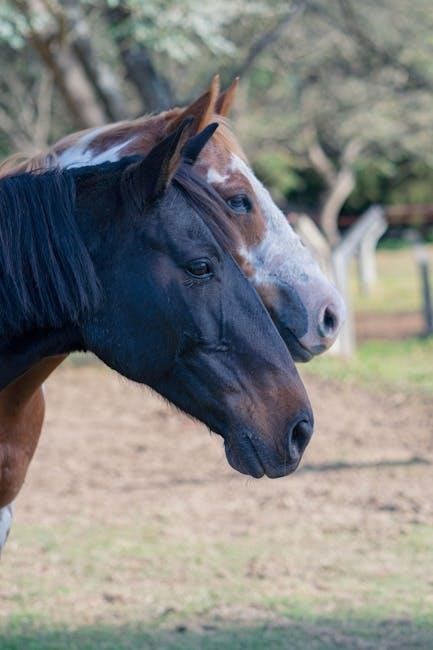
Orwell masterfully uses allegory in Animal Farm to mirror real-world political events, transforming the story into a fable that critiques societal structures. The farm represents a microcosm of human society, with animals embodying historical figures and ideologies. This narrative style allows Orwell to explore complex themes like power, corruption, and revolution through a relatable and simplified lens. The fable format makes the novella accessible while maintaining its depth, enabling readers to draw parallels between the story and historical events, such as the Russian Revolution, and understand the dangers of totalitarianism through a symbolic yet powerful narrative.
Satire and Irony
Orwell employs satire and irony in Animal Farm to critique totalitarian regimes and the corruption of power. The pigs’ gradual transformation into oppressive leaders mirrors the hypocrisy of political figures, while the other animals’ naivety reflects societal complacency. Irony is evident in the distortion of the Seven Commandments, which originally symbolize equality but are altered to justify tyranny. Orwell’s use of these literary devices underscores the novella’s themes, highlighting the dangers of unchecked power and the erosion of idealism through a lens of dark humor and tragic inevitability, making the narrative both poignant and thought-provoking.
Orwell’s Use of Language and Tone
Orwell’s language in Animal Farm is simple yet powerful, reflecting the novella’s fable-like nature. His tone is somber and reflective, critiquing totalitarianism through a lens of tragic inevitability. The narrative voice remains objective yet subtly ironic, amplifying the story’s moral depth. Orwell’s prose is direct, avoiding embellishment, which underscores the themes of corruption and betrayal. The dialogue of characters like Napoleon and Squealer reveals their manipulation and deceit, while the tone shifts from hopeful to despairing as the animals’ ideals are eroded. This deliberate language choice enhances the novella’s allegorical impact, making its themes universally relatable and timeless.
Study Guide Questions
This section includes comprehension questions for each chapter, analysis prompts on themes, and critical thinking exercises on symbolism. Essay topics are also provided for deeper exploration and understanding.
Comprehension Questions for Each Chapter
The study guide includes comprehension questions for each chapter of Animal Farm, designed to ensure a thorough understanding of the plot, characters, and themes. These questions prompt students to identify key events, analyze character motivations, and explore the significance of symbolic elements. For example, questions in early chapters focus on Old Major’s speech and the rebellion, while later chapters address power struggles and the windmill’s role. By answering these questions, readers can engage deeply with the text and prepare for further analysis. The guide also provides clear answers to support learning and retention.
Analysis Questions on Themes and Characters
The study guide offers analysis questions that delve into the core themes and character dynamics of Animal Farm. These questions encourage readers to explore how characters like Napoleon, Snowball, and Boxer embody political ideologies and moral dilemmas. Themes such as power corruption, equality, and betrayal are examined through targeted queries. Students are prompted to analyze how Orwell uses allegory to critique totalitarianism and the consequences of unchecked power. These questions foster a deeper understanding of the novella’s complex themes and their real-world implications, making it an invaluable resource for critical thinking and analysis.
Critical Thinking Questions on Symbolism and Allegory
The study guide includes critical thinking questions that explore the rich symbolism and allegorical elements in Animal Farm. Readers are asked to analyze how the farm, its structures, and the animals represent real-world political systems and historical events. Questions probe the significance of the Seven Commandments, the pigs’ manipulation of power symbols, and the corruption of ideals. These inquiries encourage deeper insights into Orwell’s critique of totalitarianism and the ways in which allegory reflects human societal dynamics. The questions also invite connections to the Russian Revolution and its aftermath, enhancing the understanding of the novella’s layered meanings.
Essay Topics for Deeper Understanding
The study guide offers essay topics designed to encourage a deeper exploration of Animal Farm’s themes and messages. Topics include analyzing the corrupting influence of power, the role of education in maintaining control, and the impact of manipulation on societal dynamics. Students are also prompted to explore the parallels between the novella and real-world political movements, such as the Russian Revolution. These essays invite learners to critically examine Orwell’s critique of totalitarianism and the universal lessons embedded in the story. The topics are crafted to inspire thoughtful reflection and a nuanced understanding of the text.
Resources and Supplements
Find the Animal Farm Study Guide PDF online, offering comprehensive questions, answers, and analysis. Additional resources include SparkNotes, chapter summaries, and educational websites for deeper insight into Orwell’s themes and historical context.
Where to Find the PDF Study Guide
The Animal Farm Study Guide PDF is widely available online. Platforms like SparkNotes, educational websites, and official school resources offer free or downloadable versions. Visit reputable sites or academic databases to access comprehensive guides with questions, answers, and detailed analyses. Some schools and libraries also provide exclusive access to these materials. Ensure to verify the source for accuracy and relevance to your study needs. Download the PDF today to enhance your understanding of Orwell’s timeless allegory.
Additional Online Resources for Study
Beyond the PDF guide, numerous online resources enhance Animal Farm study. Websites like SparkNotes offer detailed summaries, analyses, and study questions. Educational platforms provide interactive quizzes, video lectures, and discussion forums. Additionally, many schools and libraries offer access to digital study materials through their portals. Utilize these resources to deepen your understanding of themes, characters, and historical context. For visual learners, YouTube channels and multimedia presentations can also be beneficial. Explore these tools to supplement your learning and prepare effectively for exams or discussions.
Recommended Reading for Further Insight
For deeper understanding, explore additional literature on Animal Farm. George Orwell’s essays, such as “Politics and the English Language,” offer insights into his writing style and thematic concerns. Historical analyses of the Russian Revolution, like A People’s Tragedy by Orlando Figes, provide context for the novel’s allegorical framework. Literary critiques and scholarly articles on totalitarianism and satire can also enrich your perspective. These resources complement the study guide, offering a broader understanding of Orwell’s work and its enduring relevance in political and social discourse.
This study guide provides a comprehensive analysis of Animal Farm, aiding students in understanding its themes, characters, and historical context, while encouraging deeper reflection and further study.
Final Thoughts on the Study Guide
The Animal Farm Study Guide is an invaluable resource for students, offering detailed questions and answers that foster a deeper understanding of Orwell’s allegorical masterpiece. By exploring themes like power corruption, totalitarianism, and betrayal, the guide helps readers connect the novella’s events to real-world historical contexts, such as the Russian Revolution. The structured format ensures comprehensive coverage of each chapter, making it easier for students to analyze characters, themes, and symbolism. This guide not only aids in academic preparation but also enriches the reader’s appreciation of Orwell’s timeless critique of societal structures.
Encouragement for Further Study
Engaging with the Animal Farm Study Guide is a fantastic way to deepen your understanding of Orwell’s timeless novella. The detailed questions and answers not only enhance comprehension but also foster critical thinking about themes like power, corruption, and equality. For further exploration, consider analyzing how the story reflects real-world political movements or exploring Orwell’s other works, such as 1984. Additionally, resources like SparkNotes or online literary analyses can provide supplementary insights. Embrace the opportunity to connect the novel’s themes to modern issues, making your study of Animal Farm both enriching and relevant.
